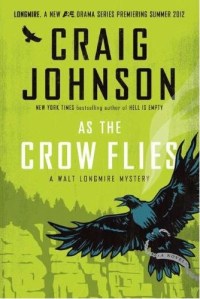Sidney Chambers and the Shadow of Death by James Runcie
 Friday, May 18, 2012 at 7:59AM
Friday, May 18, 2012 at 7:59AM 
Published by Bloomsbury USA on April 24, 2012
Sidney Chambers is an unlikely detective. As the vicar of the Church of St. Andrew and St. Mary in Grantshire, he is more comfortable hearing confessions than seeking them out, but crime seems to have a way of chasing him. The first volume in a projected series of six collectively known as "The Grantchester Mysteries," Sidney Chambers and the Shadow of Death is really a series of connected stories, each with its own title, rather than a typical novel. Recurring characters include Sidney's good friend Inspector Keating, his sister Jennifer, the close female friend, Amanda Kendall, with whom he dances around the topic of romance, his surly housekeeper and his pious curate. The stories are these:
"The Shadow of Death" - Shortly after Sidney presides over Stephen Staunton's funeral following Staunton's suicide in 1953, Pamela Morton takes Sidney aside and declares her belief that Staunton, with whom she had been having an affair, had been murdered. All the while wondering why he's getting involved, Chambers chats with various suspects. Along the way Chambers manages to tipple a bit of whiskey despite everyone's assumption that he would prefer sherry. This proves to be fortuitous as whiskey furnishes the first significant clue to the best mystery in the book.
"A Question of Trust" - An engagement ring presented at a New Year's Eve dinner party disappears. The mystery makes for pleasant but unexciting reading.
"First, Do No Harm" - A woman promises her mother that she will not marry while her mother is still alive. When the mother's death coincides with the woman's engagement, Sidney suspects foul play while finding time to ponder the ethics of euthanasia. There is very little mystery in this one.
"A Matter of Time" - When Sidney goes to a jazz club, a friend's sister is strangled during the drum solo. The murderer, like everyone else in these stories, turns out to be quite well mannered.
"The Lost Holbein" - A rare portrait has been stolen and replaced with a forgery. This story puts Amanda in the forefront of tracking down the wrongdoer, leaving Sidney to come to her rescue. A predictable yarn and again, not much of a mystery.
"Honourable Men" - Sidney takes a minor role in Julius Caesar. On opening night, the actor playing Caesar is actually stabbed to death. The story strives for social relevance but Sidney's attitudes, far ahead of their time, seem artificial. Despite its preposterous set-up, the story at least presents a mystery, albeit one that is easily solved.
This is a gentle, civilized book, filled with conversation and thought rather than gun battles and thrilling escapes. Sidney spends as much time fretting about being a better priest as he does solving mysteries. Perhaps a more religiously observant reader will relate to Sidney's internal struggles, but he seems like such a squeaky clean guy that I had difficulty understanding his anxiety. I agree with much of Sidney's overriding philosophy -- his respect for privacy, his belief that "we must think the best of people" -- but a pleasant state of mind does not suffice to make a character interesting.
The stories may appeal to fans of cozy mysteries; Sidney is likable and the text is free of profanity. For my taste, the stories are a bit dull. Perhaps the characters, including most of those who are supposed to be sinister, are just too nice. Instead of a police procedural we're given a clergyman procedural detailing the life of a determinedly unexciting vicar. His work, his love of jazz, and his chaste admiration of Amanda Kendall might be enough to fill his life but they do little to ward off the reader's drowsiness. More problematic is that most of the stories fail to meet the test of a good mystery; they are just too easy to solve.
James Runcie writes in a low-key style that is fluid, sometimes elegant, occasionally stuffy, and too often long-winded. He doesn't quite know when a story should end, or he feels the need to give Sidney yet another chance to sermonize. Given my admiration of Runcie's prose, I am sorry that I cannot give Sidney Chambers my wholehearted recommendation. The stories simply lack the kind of tension that a mystery should deliver, and they don't succeed as character-driven literature, although they try to be both.
RECOMMENDED WITH RESERVATIONS



